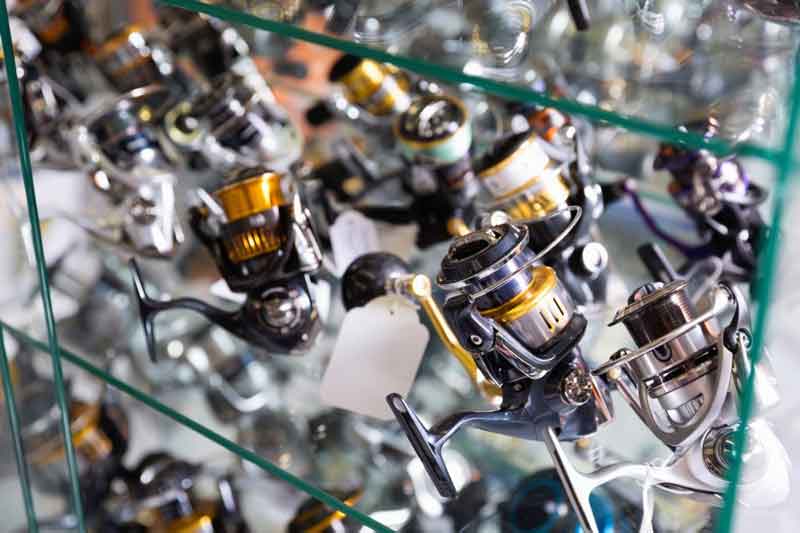Spending time in the great outdoors is a fantastic and fun way to relax and let the cares of the world wash away from you.
Even the most competitive angler will admit that fishing for sport is a great way to mitigate the problems of the world and get some peace of mind.
Go fishing, whether as a newbie or someone with experience, and you are likely going to get stuck in a debate: should I use a baitcasting reel or a spinning reel?
We are here, hopefully, to help you pick a side.
What Are You Catching?
You need to know what you are going to be fishing for and more importantly what size of fish you are looking to get on the end of your reel.
A spinning reel is ideal for small to medium-sized fish, but if you are looking to go and catch a whopper from the water, a baitcasting reel is much better suited to the job.
How Much Experience Do You Have?
How many people think it is a good idea to put a newly qualified driver behind the wheel of a Ferrari or Porsche? Or a newly qualified pilot on a commercial Boeing 747?
You wouldn’t because you’re sensible enough to know that you work your way up to the more complex things in life.
It’s no different in this debate.
As a beginner or relatively new angler, you want a reel that is going to be simpler to use. That is the spinning reel.
With more experience, you can move onto the more advanced baitcasting reel which will take some time and a bit of extra effort to master.
How Much Accuracy And Control Are You Looking For?
People with years of fishing experience obsess about the lures they are going to use.
A lure of about ten pounds in weight is ideal for use with a spinning reel, and you are going to be extremely unlucky to see your line break.
Using a heavy lure leads you towards using a baitcasting reel quite simply because you will want to have a greater deal of control which is something the baitcasting reel provides.
A spinning reel is not great for control and accuracy. It can be especially frustrating for an experienced angler. But for a beginner, who likely can’t hit the same spot twice anyway, it’s the ideal piece of equipment.
Accuracy and control are features of a baitcasting reel, and that’s why experienced anglers who can land on the exact spot they’re aiming for love them.
What’s the Chance of Backlash?
A baitcasting reel in an inexperienced hand is backlash simply waiting to happen.
Backlash, for those newbies unacquainted with the term, is where you’ve cast your lure, but it slows down while you spool maintains its speed. What you end up with is a tangled mess that will frustrate the life out of you and stop your fishing whilst you try to resolve the issue.
Now, we’re not going to give you tips on how to avoid a tangle with a baitcasting reel. Instead, we’re telling you as the inexperienced angler to stick with a spinning reel which is more resistant to such disasters.
Though it won’t happen often, even experienced anglers will sometimes find their baitcasting reels becomes a complete mess.
Which Reel Has a Greater Line Capacity?
With a spinning reel, an average casting distance is possible, and you have a greater choice when it comes to the type of line you wish to use.
Choose a baitcasting reel if you require a further than average casting distance and plan on using what would be considered a heavier line.
How Easy Are They To Maintain?
This is quite an important question because you don't want to buy something and find that it's so difficult to maintain that you end up discarding it in the trunk of the car or at the back of a cupboard.
Maintaining either type of reel is not too difficult.
The spinning reel has a less complex structure than a baitcasting reel so makes it the easier of the reels to disassemble and clean, but that doesn’t mean that maintaining a baitcastingreel is difficult.
What you will find is that a baitcasting reel takes more time to maintain than a spinning reel. But once you get the hang of maintaining a certain bit of equipment, everything is mostly smooth sailing.
Which Reel is More Durable?
This relates to maintenance, how often you are using your equipment, and whether you are using it correctly. They are variables in your control.
A baitcasting reel, generally speaking, is the more durable of the reels. But it depends on how well you look after it.
Which is More Costly?
Spinning reels are usually cheaper, and what you should be looking for on a budget.
But if you are going to have to keep replacing it due to some heavy-duty fishing, you may want to offset that by getting a more durable baitcasting reel.
Pros and Cons of Spinning Reel
Pros
Cons
Pros and Cons of Baitcasting Reel
Pros
Cons
Final Word
The baitcasting reel v spinning reel isn’t a debate that is going to go away.
If anything, your main takeaway from this piece is that experience is the greatest determining factor on which option you choose.
An experienced angler can make the most of the enhanced attributes a baitcasting reel has in comparison to a spinning reel, whereas a newbie is likely to find themselves in a tangle very quickly.
